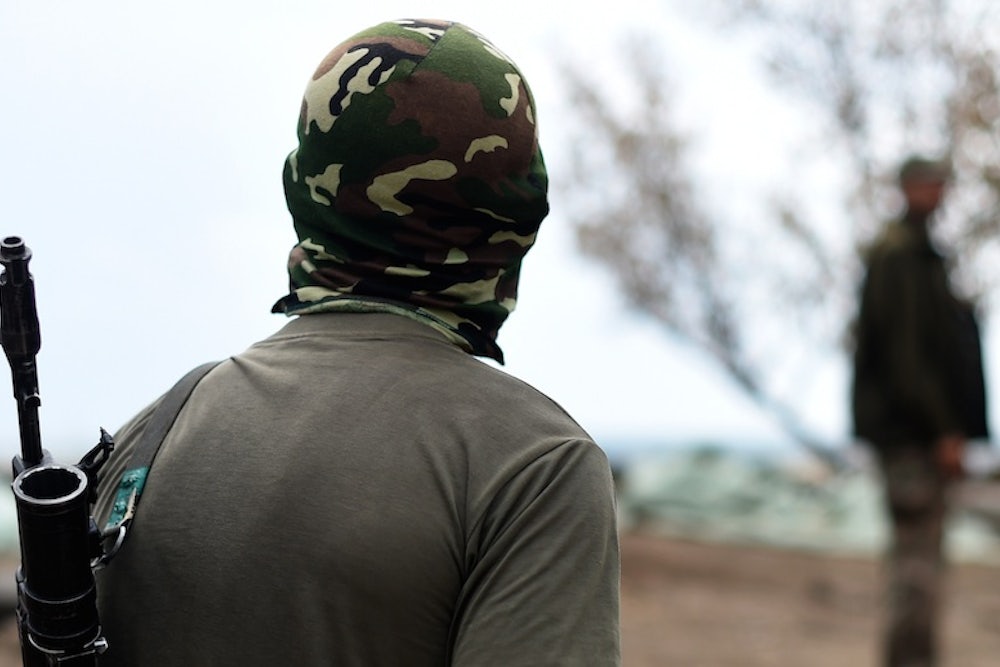The presence of Russian military personnel in Ukraine is now beyond dispute, everywhere except in Russia. On Thursday, NATO released satellite imagery of Russian combat troops operating inside Ukraine’s borders, prompting mild international expressions of concern about the deteriorating situation. Russian paratroopers have been filmed discussing their operations in Ukraine. In a press conference on Wednesday, captured Russian soldiers said they entered Ukrainian territory “in convoys. Not on the roads but through the fields.”
According to NATO, “well over” 1,000 Russian soldiers are fighting in Ukraine. Many have already died in fighting, like the paratroopers who were secretly buried in the Russian city of Pskov, 1,600 kilometers from the Ukrainian border. The Russian government has denied that the soldiers were killed in Ukraine. “There is no information about how or where they died,” Radio Free Europe reports. Surely, now that this seemingly incontrovertible evidence of a Russian invasion is out in the open, the Kremlin will have to fess up, and the U.S. and Europe will have to respond?
Not so. Russian President Vladimir Putin’s refusal to discuss the possibility of a ceasefire at Tuesday's failed diplomatic summit in Minsk with Ukrainian President Petro Poroshenko reveals the extent to which the Kremlin will not forfeit its deniability. Russia "cannot talk substantively about a ceasefire, about any agreements between Kiev, Donetsk and Lugansk—this is none of our business, it's the business of Ukraine itself,” Putin said on Tuesday. At Thursday's UN Security Council emergency meeting, Russian UN envoy Vitaliy Churkin said, "The current escalation is a direct effect of Kiev’s criminal polices and war being waged against its own people”—it has nothing to do with Russia, the Kremlin line goes. The Russian Foreign Ministry is claiming that the only reason Kiev has sounded the alarm of a full-fledged Russian invasion this week is because the Ukrainian “anti-terrorist operation” is failing in the east, RIA Novosti reports, leaving aside the obvious reason why the Ukrainian military has suffered setbacks recently, which is that Russia opened up a new front in southeastern Ukraine this week. Izvestia reports that Ukraine is accusing Russia of invading only because the “President of Ukraine is looking for an external enemy” to fend off domestic disapproval.
Russian troops are now reportedly advancing toward the previously peaceful coastal city of Mariupol, where hundreds of people gathered today to rally for peace. In Donetsk, there has been a “sharp escalation” in fighting, prompting Poroshenko to cancel a trip to Turkey on Thursday and assure the nation that the situation in the east is “extremely difficult, but under control.” Ukraine is, understandably, looking to NATO and the E.U. for help, but doing so is precisely what is egging on further Russian intervention within its borders.
Let’s recall that back in April, when NATO released satellite imagery of some 40,000 Russian forces clustering at the border, the Kremlin responded by saying the images were a blatant exaggeration and that, in The New York Times' paraphrase,"any stationing of NATO troops near Russia’s borders would be a violation of international agreements.” Now, NATO is ramping up its military presence in Eastern Europe, which the Kremlin will have to react to. “No matter what our Western counterparts tell us, we can see what’s going on. As it stands, NATO is blatantly building up its forces in Eastern Europe, including the Black Sea and the Baltic Sea areas. Its operational and combat training activities are gaining in scale,” Putin told his security council last month.
So perhaps it was not the wisest move for Ukrainian Foreign Minister Pavlo Klimkin to suggest on Thursday that NATO hold its next summit in Kiev. Russia is doing everything it can to prevent Ukraine’s E.U. Association Agreement from going into effect; Putin has promised that Russia will respond if the Ukrainian parliament ratifies the agreement in September. The U.S. and E.U. may now be compelled to impose increased sanctions, further cornering Russia and prompting the Kremlin to lash out. None of this suggests that a solution, or any prospect of deescalation, is nigh.
And it would be foolish to suggest, as some have argued in light of the discovery of the Pskov burials, that evidence of Russian casualties in Ukraine will in any way force Putin’s hand in the conflict, or cost him support domestically. As Anna Politkovskaya famously chronicled in her investigations of the Russian military, the lives of Russian soldiers are worth nothing to the state: “The army in Russia is a closed system no different from a prison. ...How would you feel if when your son turned eighteen, he was conscripted as ‘human matériel’?...What would you think of an army in which, in a single year, 2002, a complete battalion, more than five hundred men, had been killed not by enemy fire but by beatings,” Politkovskaya asks in Putin's Russia: Life in a Failing Democracy.
The Kremlin will continue to deny its involvement in Ukraine, and the U.S. and E.U. will take their time calling this an outright invasion. Russia has made its objectives in Ukraine clear, and has signalled its resolute unwillingness to participate in military negotiations while its political concerns go unresolved. So long as Ukraine's E.U. agreement, NATO partnership, and new government are viable projects, the fight will continue.
A previous version of this article incorrectly stated that a diplomatic summit between Russia and Ukraine was held in Minsk on Sunday, August 24. In fact, the meeting took place on Tuesday, August 26. The article has been updated to correct the inaccuracy.
